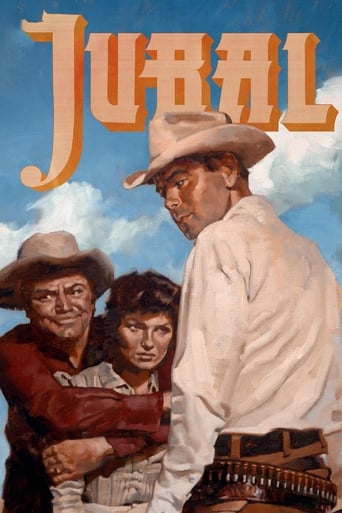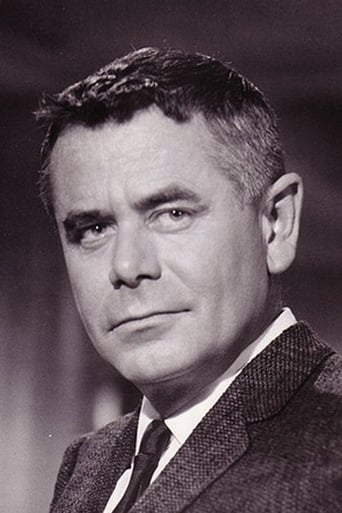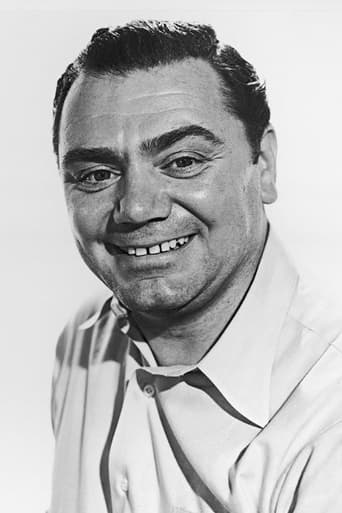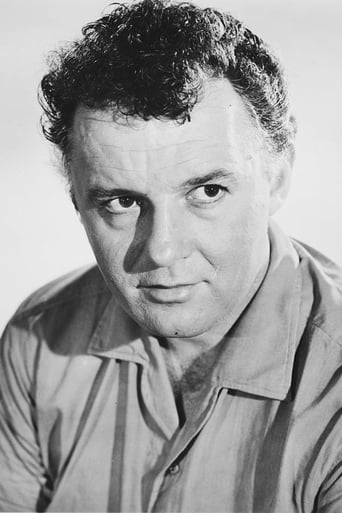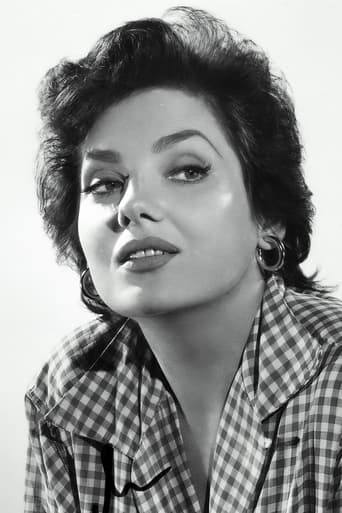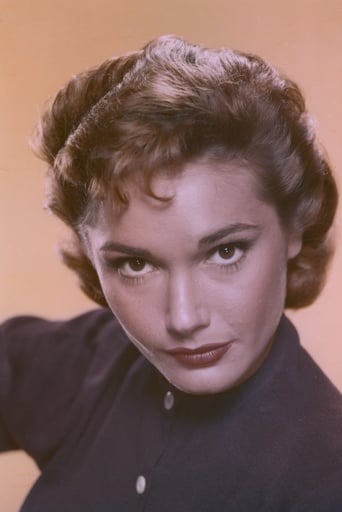SparkMore
n my opinion it was a great movie with some interesting elements, even though having some plot holes and the ending probably was just too messy and crammed together, but still fun to watch and not your casual movie that is similar to all other ones.
Neive Bellamy
Excellent and certainly provocative... If nothing else, the film is a real conversation starter.
Marva-nova
Amazing worth wacthing. So good. Biased but well made with many good points.
Nicole
I enjoyed watching this film and would recommend other to give it a try , (as I am) but this movie, although enjoyable to watch due to the better than average acting fails to add anything new to its storyline that is all too familiar to these types of movies.
Wuchak
Released in 1956, "Jubal" is easily one of the best 50's Westerns and ranks with my all-time favorites.THE STORY: An injured drifter, Glenn Ford as Jubal Troop, is rescued by ranch-owner Shep (Earnest Borgnine), who ultimately promotes him to foreman of his ranch. This stirs up the envy of ranch-hand Pinky (Rod Steiger) and the desire of Shep's young sexpot wife, Mae (Valerie French), which results in even more hostility from Pinky since he used to enjoy the adulterous attentions of Mae until Jubal came along. The captivating drama is as old as the story of Joseph and Potiphar's wife from Genesis 39.Add to this mix a group of trespassing Mennonites (or perhaps Quakers) who have in their company Naomi (Felicia Farr), a godly woman who attracts Jube's romantic eye, and Reb (Charles Bronson), another drifter who befriends Jube.WHAT WORKS: For the first hour and ten minutes or so "Jubal" is captivating cinema of the highest order. Shep (Borgnine) is simpleminded and naïve, but likable and full of mirth. Mae (French) is fully clothed at all times, yet somehow oozes sexuality with every simple glance or word, proving that sexiness involves way more than merely showing skin. Naomi (Farr) is an interesting addition to the story: her purity attracts Jube just as much as Mae's adulterous tactics turn him off.Rod Steiger is perfect as the villainous Southerner-turned-Westerner "Pinky." Notice how his hostility toward Jubal is rooted in arrogance, envy and jealousy. Also notice that his strategy to destroy Jubal is deception -- getting others to believe lies. This is how it happens in real life with enemies who hate you for no actual reason. Since there's no grounds for their hatred they resort to lies to destroy your reputation and poison people's minds against you.Glenn Ford is perfect as the tragedy-laden drifter and how can you go wrong with (a young) Charles Bronson?A big bonus is that the film was shot on location with the mighty Grand Tetons as a backdrop the entire story. These magnificent Wyoming mountains are nothing short of breathtaking!The last act is potent in that it reveals the destructive power of a lie, IF it's believed. The only people liars can deceive are simpletons with no discernment; the wise remain skeptical until they observe concrete proof. You'll notice that two of Shep's men refuse to take Pinky as his word because they discern his fleshly motivations, not to mention they likely caught him in lies before. WHAT DOESN'T WORK: There's too much scampering around in the last act as the plot ties-up loose ends, but it's redeemed by the powerful subtext. Also, the opening credits score is understandably dated but, thankfully, the rest of the score isn't bad for the 50s; in other words, it doesn't prevent you from enjoying the movie.BOTTOM LINE: Make no mistake, "Jubal" is a powerful psychological Western; there's thankfully no Disney-like unrealistic vibe anywhere to be found, nor lame attempts at humor (like "The Desperadoes"). The film expertly touches on issues of friendship, envy, jealousy, competition, lust, hate, love, hope and the destructive power of a lie. Let me add that Jubal is a man of fascinating noble character: he amazingly resists the skillful advances of the luscious Mae, like Joseph with Potiphar's wife, obviously because he wanted something better -- a woman he could trust!"Jubal" is a must for every Western fan's film library.The film runs 100 minutes.GRADE: A
stephenrtod
"Jubal" paints character, conflict and theme with extremely broad, expressionistic strokes.Women, as symbolized by Mae, are very one-dimensional in this 1956 Western starring Glenn Ford, Rod Steiger, Ernest Borgnine, and Charles Bronson. Men, too, seem shaped as if out of the very prairie, mesa, or arroyo, in which they work as cattle men, which apparently precludes much knowledge of how women think, act, and, especially react.What is true about "Jubal" is that a woman in love who is not only neglected but, moreover, treated like a possession and taken for granted, will respond with sorrow, then fury and then betrayal. That sounds like a very sexist statement to make in 2013, but in the world of the mid-1950s, Hollywood has very rigid ways of depicting men, women, and minorities.Shakespeare knew that there is a sort of invisible pecking order in the military, and on the range. Men must trust each other or what they see as order will crumble, disintegrate. A woman alone, unable to run away, unable to fight back on the same level ground as a man, must resort to what used to be called feminine wiles.The fact that even when I graduated from high school in 1963, the top three likely professions for women consisted of (a) teaching (b) nursing and (c) secretarial. To watch "Jubal" now is a very saddening experience.Shakespeare's Iago manufactured jealousy out of circumstantial evidence, and he does so by playing to each victim's weaknesses and their trust, appealing to their irrational fears, and their ignorance of the truth combined with the unknown, upon which Pinky is able to capitalize in this story.There is much straight-line, point-to-point male and female thinking in this story, but Pinky is the glue that makes this ugly jigsaw puzzle materialize. The first clue of that truism is the unthinking labeling and wrath that almost erupts when the cattle men deduce, by fragrance alone, that Jubal is a sheep man, which turns out not to be true, but it demonstrates how dangerous, how deadly, how fatal misunderstanding, false belief can truly become in action.We may never know, but history's patterns teach us, that a demagogue preys upon the gullibility of the innocent, the naive, and the too-trusting.Without the spurs, and the saddles and the range wars over sheep versus cattle, the fact reverberates in this fable that innuendo can cripple and kill. Alfred Lord Tennyson insisted that "A half truth is the blackest of lies."
Jeff (actionrating.com)
Skip it – This is a heart-warming western, but the plot has been recycled so often that you've probably seen it a dozen times. A mysterious man joins up with a ranch and impresses everyone with his cowboy skills. He quickly works his way up the ranks and wins the trust of the boss. But the man who wants to be foreman gets jealous and tries to turn the boss against him. That's it in a nutshell. This western does feature a great cast including Glenn Ford, Ernest Borgnine, Charles Bronson, and Rod Steiger. But if a plot is unoriginal, you need more than a great cast. You need action - and on that front, this movie does not deliver. There's only one significant gunfight to speak of. Most of the movie feels like a soap opera.
Martin Bradley
Othello out West. Delmar Daves' great and unjustly neglected western finds Glenn Ford's title character falling prey to ranch-hand Rod Steiger's Iago-like jealously when Ernest Borgnine's Othello-like father figure picks him as his foreman and surrogate son. Throw in the machinations of wife Valerie French who has the hots for Ford and it isn't difficult for Steiger to convince Borgnine that there's something going on.If Shakespeare's play is the blueprint, Daves' film is suitably complex in its own right and if Steiger displays a tendency to chew the scenery as he was wont to do, both Borgnine and Ford are outstanding, with Ford in particular proving something of a revelation. He has a terrific scene with Felicia Farr in which he describes his appalling childhood and how it made him the man he is. It's also magnificently photographed in cinemascope by Charles Lawton Jr; the exterior scenes are often breathtaking while the interiors use the widescreen to superb spatial effect.
